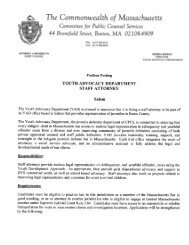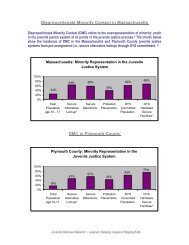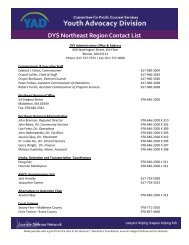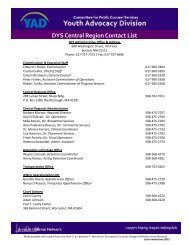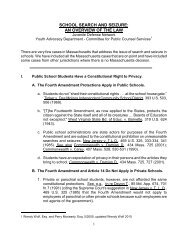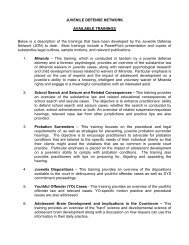States rethink 'adult time for adult crime' - the Youth Advocacy Division
States rethink 'adult time for adult crime' - the Youth Advocacy Division
States rethink 'adult time for adult crime' - the Youth Advocacy Division
You also want an ePaper? Increase the reach of your titles
YUMPU automatically turns print PDFs into web optimized ePapers that Google loves.
concentration camp or Guantánamo, that would be bad, but in an occupation<br />
situation, to mark someone down <strong>for</strong> fur<strong>the</strong>r surveillance, that might be<br />
appropriate.”<br />
Paul Root Wolpe, who teaches social psychiatry and psychiatric ethics at <strong>the</strong><br />
University of Pennsylvania School of Medicine, says he anticipates that<br />
neuroscience predictions will move beyond <strong>the</strong> courtroom and will be used to<br />
make predictions about citizens in all walks of life.<br />
“Will we use brain imaging to track kids in school because we’ve discovered that<br />
certain brain function or morphology suggests aptitude” he asks. “I work <strong>for</strong><br />
NASA, and imagine how helpful it might be <strong>for</strong> NASA if it could scan your brain<br />
to discover whe<strong>the</strong>r you have a good enough spatial sense to be a pilot.” Wolpe<br />
says that brain imaging might eventually be used to decide if someone is a worthy<br />
foster or adoptive parent — a history of major depression and cocaine abuse can<br />
leave telltale signs on <strong>the</strong> brain, <strong>for</strong> example, and future studies might find parts<br />
of <strong>the</strong> brain that correspond to nurturing and caring.<br />
The idea of holding people accountable <strong>for</strong> <strong>the</strong>ir predispositions ra<strong>the</strong>r than <strong>the</strong>ir<br />
actions poses a challenge to one of <strong>the</strong> central principles of Anglo-American<br />
jurisprudence: namely, that people are responsible <strong>for</strong> <strong>the</strong>ir behavior, not <strong>the</strong>ir<br />
proclivities — <strong>for</strong> what <strong>the</strong>y do, not what <strong>the</strong>y think. “We’re going to have to make<br />
a decision about <strong>the</strong> skull as a privacy domain,” Wolpe says. Indeed, Wolpe<br />
serves on <strong>the</strong> board of an organization called <strong>the</strong> Center <strong>for</strong> Cognitive Liberty and<br />
Ethics, a group of neuroscientists, legal scholars and privacy advocates<br />
“dedicated to protecting and advancing freedom of thought in <strong>the</strong> modern world<br />
of accelerating neurotechnologies.”<br />
There may be similar “cognitive liberty” battles over ef<strong>for</strong>ts to repair or enhance<br />
broken brains. A remarkable technique called transcranial magnetic stimulation,<br />
<strong>for</strong> example, has been used to stimulate or inhibit specific regions of <strong>the</strong> brain. It<br />
can temporarily alter how we think and feel. Using T.M.S., Ernst Fehr and Daria<br />
Knoch of <strong>the</strong> University of Zurich temporarily disrupted each side of <strong>the</strong><br />
dorsolateral prefrontal cortex in test subjects. They asked <strong>the</strong>ir subjects to<br />
participate in an experiment that economists call <strong>the</strong> ultimatum game. One<br />
person is given $20 and told to divide it with a partner. If <strong>the</strong> partner rejects <strong>the</strong>




